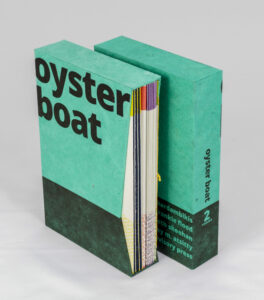Oyster Boat
Oyster Boat is a series created and published by Small Craft Advisory Press (SCAP). Our name connects us to our region: the Gulf Coast. Many mornings, the coastal marine weather report includes a “small craft advisory,” which warns small boats of hazardous conditions. SCAP is named after this warning. Our Oyster Boat series is named for the vessels—the small crafts— that harvested oysters in the nearby Appalachicola Bay until 2020.
The books in the Oyster Boat series are one form of collaborative exploration we pursue here at SCAP. We ask our Oyster Boat collaborators to send us fragments that are valuable to their working practice, but are incomplete or unfinished. The fragments are an invitation to experiment and respond. Oyster Boat issues don’t have individual titles. They are simply one possible way to respond to another’s practice. Each issue is about experimenting with books as a structure for ideas resulting in one of many possible solutions a collaboration can take.
Oyster Boat fishes for the leftovers, deletions, false starts, or byproducts of making—the waiting spat. Bringing the peripheral to center focus, it harvests from the drafts and trimmings of contemporary artists, writers, and thinkers.
Hand-printed in small editions, Oyster Boat celebrates the sediment-rich material that feeds creative practice while charting new territories in collaboration and experimental book production.


